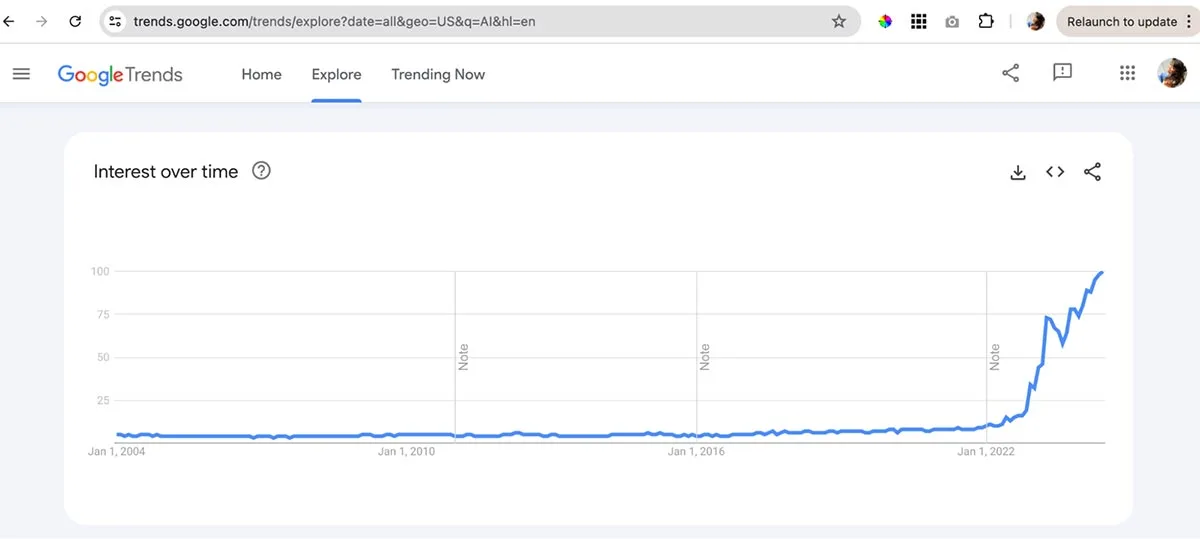How digital agencies can leverage AI to work smarter
Working in a digital agency often means long hours, tight deadlines, and multiple rounds of reviews. Launching new projects and staying on top of algorithms can be time consuming tasks. That said, artificial intelligence (AI) can help digital marketers work smarter, not harder—thereby staying on top of their clients’ workloads.
Today, AI helps digital agencies save countless hours each week. Through the use of AI, marketers can save time, energy, and internal bandwidth on data analysis, content creation, customer service, and marketing automation. Plus, AI tools can help optimize ad spend, reduce human error, and increase an agency’s bottom line.
Read more about how digital agencies can leverage AI to maximize output and provide superior customer service.

What is AI exactly?
AI stands for artificial intelligence. AI is a type of technology that allows computers and machines to mimic humans’ thought processes and problem-solving skills. In essence, AI allows a computer to replicate tasks normally assigned to a person or employee.
AI “learns” to complete certain tasks through existing data—just like a person. For example, as a young student, you learned the meaning of numbers and letters. As you acquired more information, you were able to do more complex tasks, such as solving algebra problems or writing a thesis.
The same is true for computers. The more data collected, the more accurate (and complex) the output. Today, AI allows computers to design photos and videos, write software code, replicate molecular structures, and even pass the bar exam.
The history of artificial intelligence

It may seem as though the hype around AI just began. According to Google Trends, the term “AI” received a rating of 10 or below prior to 2022. Since then, interest in AI has grown exponentially, maxing out at a 100-level rating in June 2024.
In reality, the term “artificial intelligence” was coined in the 1950s. At first, the phrase was barely a theory, with computers able to execute specific tasks but not replicate them. By the 1970s, AI could interpret human language and solve problems, and by the late 1990s, the reigning world chess champion was bested by a computer program. Today, we use AI in our regular lives without realizing it, like Netflix compiling our favorite shows and GPS apps predicting the best route.
How digital agencies can leverage AI to increase their bottom line

As the application of AI has grown, so has the apprehension surrounding it. Many creatives—including marketers—have worried artificial intelligence would render them jobless. In reality, AI can make creatives’ lives and jobs easier, thereby giving them a competitive edge.
Discover how marketers can eliminate repetitive tasks, create workflows, and boost their overall customer experience using the power of AI.
1. Send email campaigns to your target audience
As every digital marketer knows, a well-targeted email marketing campaign requires more than a clever subject line. A successful email sequence involves sending the right message to the right audience with the right call to action at the right point in time.
Fortunately, artificial intelligence can help your team draft body copy, enhance segmentation, personalize subject lines, and even craft the perfect outreach cadence. If you’re aiming to use AI technology to improve your email marketing efforts, consider these tools:
- Mailchimp: Mailchimp is an affordable, easy-to-use email marketing and SMS tool popular among small business owners. With Mailchimp’s AI tool Intuit Assist, you can filter mailing lists, generate headers or paragraph text, or personalize campaigns at scale.
- Optimove: Optimove’s AI-driven marketing platform sends targeted emails on your behalf, learning from customer interactions. It studies past consumer behavior and automatically adjusts timing and content to increase your chances of a conversion.
2. Optimize content for SEO
Having a visible presence on search engines is imperative to attracting new customers. As part of your content marketing strategy, aim to weave in targeted keywords throughout your writing. And with the help of AI, you don’t need to be an SEO whiz to gain traction in search engines.
AI marketing tools can help with performing keyword research, optimizing existing content, and discovering related keywords. If you want to get the best return on investment from your content marketing strategy, consider these SEO tools:
- Dashword: Dashword is an SEO-powered content tool that helps generate new content, craft ideas, create outlines, and optimize existing posts. After finishing a blog post, enter your post into its SEO tool to see which keywords to use to increase visibility in search engine results.
- Clearscope: Clearscope, like Dashword, is a content platform most known for its SEO capabilities. Simply enter your completed blog post into its grading platform, and it will tell you exactly what keywords to use (and how many times to use it) to target a specific keyword phrase.
3. Use chatbots to provide superior customer service
Excellent customer service is one of the most important aspects of running a digital marketing agency. However, one-on-one conversations with each of your clients (and prospects) might not always be possible.
To save time for your marketing team and free up bandwidth for other tasks, consider installing a chatbot to facilitate client communications. A chatbot is an AI-generated tool that provides helpful responses to commonly asked questions and/or inquiries. Plus, it gives customers and prospects valuable information without having to wait on hold or schedule a meeting—creating a win-win scenario for all involved. If you’re considering using an AI chatbot for your business, check out the following:
- Yelp: Yelp Assistant helps people connect with service providers in their area by intelligently guiding customers through the process of finding the right pro for the job. It contextually understands the customer’s project or problem, engages in a professional-like dialogue with follow-up questions, and then matches the customer with businesses that are qualified to help with their project.
- Freshworks: Freshworks’ AI-powered tools include a powerful chatbot feature that can make data-driven decisions and respond to customer inquiries. With Freshworks, your chatbot can deliver real-time solutions, create personal interactions with customers, and answer frequently asked questions.
4. Draft new content
Developing a well-rounded content strategy is essential for marketers—both internally and for clients. Within your own agency, you’ll likely develop blog posts, social media captions, and email sequences to attract new clients and retain current ones. Your clients trust you to do the same for them, developing targeted campaigns to attract new customers and expand market share.
If it feels as though your team is constantly writing new content (or brainstorming ideas for new content), artificial intelligence can help. With AI, your team can write briefs, draft social media posts, write outlines, or even get new ideas based on upcoming market trends. If you aim to streamline content generation with AI, consider these tools:
- ChatGPT: ChatGPT is one of the most well-known AI tools. Marketers and other creatives can type virtually any prompt and ChatGPT will provide a response. For example, you could ask ChatGPT to analyze customer data, provide 12 new social media captions, or write a story on how to improve your paid ad campaigns.
- Jasper: Jasper, like ChatGPT, uses cutting-edge AI to produce new content based on writing prompts. However, Jasper was created specifically for digital marketers, analyzing your (or your client’s) website to produce content in your unique tone and voice.
- Claude: Claude is another AI generative writing tool that helps marketers produce high-quality content. Claude’s niche is conversational text, helping marketing teams write content with extra flare or personality.
5. Fix bugs on your clients’ websites
As a digital marketer, chances are you’ll need to integrate new tools into your client’s website. Tools like ecommerce, email automation, and CRM platforms shouldn’t exist in a silo—instead, they are meant to work as one, cohesive unit.
Whether you’re looking to integrate new tools, host a client’s site, or simply keep up on website maintenance, you’ll need a working knowledge of code. If a particular bug is outside your current understanding, artificial intelligence can help. The next time you encounter a coding issue, leverage one of these tools first:
- GitHub CoPilot: GitHub CoPilot is an artificial intelligence tool built exclusively for software development. Simply type in your prompt and GitHub CoPilot will check your syntax or finish your line of code.
- Captain Stack: Captain Stack is an AI development tool meant for those just beginning to code. Type in your query and the platform will generate new code or autocomplete an existing line of code.
6. Check all written work for typos
Even high-profile brands like the New York Times endure the dreaded typo once in a while. That said, as a digital marketer who writes content for clients, continuous grammatical or spelling errors can greatly decrease your legitimacy as an agency.
When the standard spell check isn’t cutting it, consider using AI. Artificial intelligence has been a game changer in proofreading, capturing spelling errors, improving styling and tone, and suggesting a better word choice. If you’re looking to cut down on the time-consuming task of copyediting, consider these tools:
- Grammarly: Grammarly is a relatively well-known and trusted AI tool, helping professions proofread and improve their writing. This writing assistant can finish prompts, add personality to your copy, or check for typos.
- Writer: Writer is a full-stack generative writing tool and editing assistant with slightly higher pricing than Grammarly. When you copy and paste your blog post or social media caption into the platform, it will check your writing by consulting your brand style guide, or that of your client.
7. Create on-brand images for deliverables
Image research is one of the most time-consuming tasks within a graphic design department. Unless a client is willing to conduct a photoshoot, it can be difficult to find high-quality, on-brand images that don’t look like stock images.
Unfortunately, original photography can be expensive and time consuming to schedule, particularly if you need a large variety of photos from a single shoot. Rather than rely on stiff stock imagery that might not look authentic, you can generate new images using AI. To create new images, consider the following tools:
- Midjourney: Midjourney is a machine learning model that generates images from text prompts. It has transformed the marketing landscape by giving creatives on-brand, high-quality, and high-resolution images that can be downloaded directly to your device.
- Canva: Canva has become a popular tool amongst solopreneurs and smaller agencies for its affordability and ease of use. Now, Canva comes with its own AI image generator, allowing you to turn your prompts into new images.
- Stability AI: Stability AI is a powerful AI tool that condenses vast amounts of data in order to generate video and images. Digital marketers can easily leverage the text-to-image tool to create unique, on-brand images for client websites, social posts, or advertisements.
8. Conduct data analysis to better understand consumers
Paid advertising is one of the quickest ways to tap into new markets and grow your customer base. That said, unless you conduct thorough market research on your target audience, paid ads won’t have the anticipated impact. To create valuable insights into your customer base, use paid ad tools, like Yelp Ads, which help get your content in front of the right people. You can also use AI tools such as:
- User evaluation: User Evaluation’s AI tools create a clear depiction of your target audience through reports, models, and insight templates. With customer data visualization, you’re better equipped to know who to target with your paid ads and how to optimize your creative assets.
- Albert: Albert is an artificial intelligence platform that works with your existing marketing stack. In essence, Albert analyzes existing and former campaigns and clients to create a more specific consumer profile, thereby getting you more bang for your buck throughout each campaign.
Continue learning how digital agencies can leverage AI

Artificial intelligence has transformed the digital marketing landscape, helping to generate new imagery, cut down on editing, check lines of code, and provide an overall better user experience for your clients. With the use of AI, you can save countless hours each week on project management, social media marketing, and image research.
Looking for more information on how digital agencies can leverage AI to boost customer engagement? Discover nine valuable AI tools to cut down on meetings, predict customer behavior, and make informed decisions for your clients.
Ready to become a Yelp Advertising Partner?
Contact us today to find out how Yelp advertising drives qualified leads for your clients.
